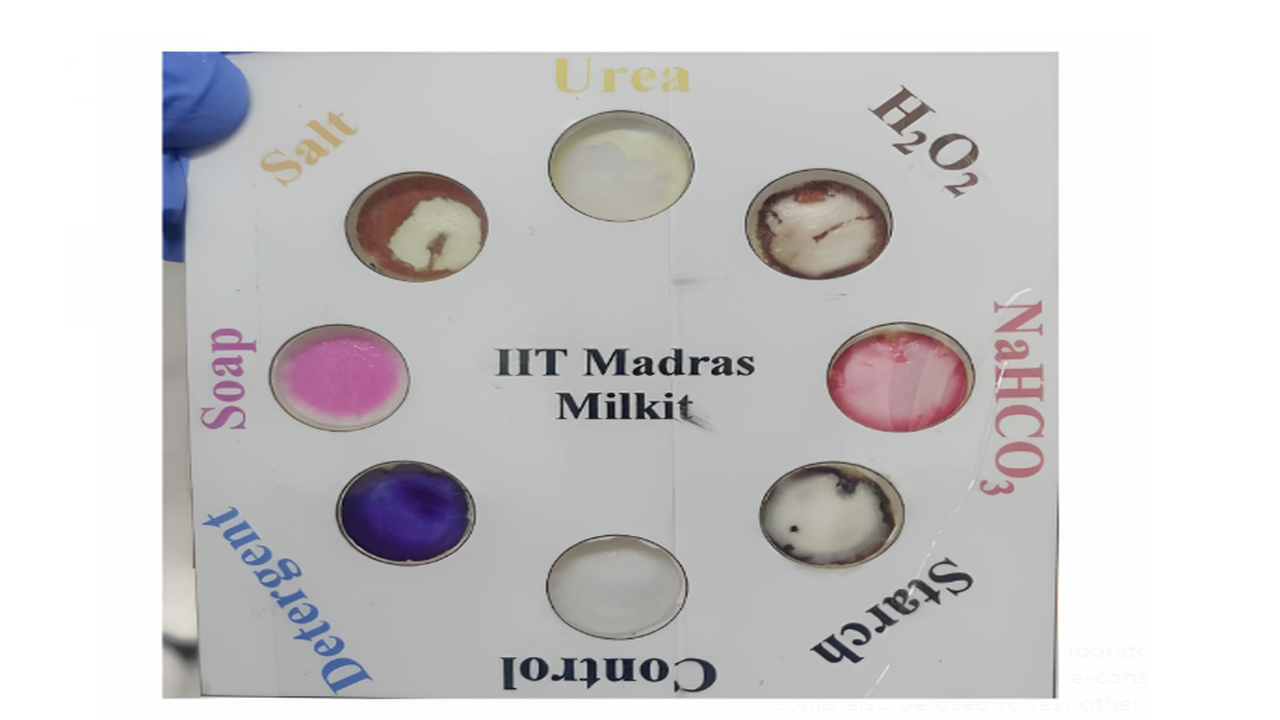[ad_1]
CHENNAI: Researchers at Indian Institute of Technology – Madras (IIT Madras) have developed a three-dimensional (3D) paper-based portable device that can detect adulteration of milk in 30 seconds.
The test could be performed at home. It can detect multiple substances used as adulterating agents, including urea, detergents, soap, starch, hydrogen peroxide, sodium-hydrogen-carbonate, salt and others.
Unlike the conventional laboratory-based methods to test the purity of milk which is both expensive and time-consuming, this new technology is affordable and could also be used to test other liquids such as water, fresh juices, and milkshakes for traces of adulteration.
“Only a millilitre of any liquid would be used as a sample to test for adulterants,” said Pallab Sinha Mahapatra, associate professor, department of mechanical engineering, IIT-Madras, who led the research.
Using colorimetric detection techniques, all the adulterants are detected in different liquid samples. “It is inferred from the investigation that the reagent only reacts with the specific adulterant in this method and not with any milk ingredients,” Mahapatra said.
The novelty of the design is that the device can detect multiple adulterants. “The 3D paper-based microfluidic device is made of three layers. This design works well for transporting denser liquids at a consistent speed. The paper is treated with reagents and is left to dry. All the reagents are dissolved either in distilled water or in ethanol, depending upon solubility,” he added.
This analytical tool can help monitor liquid food safety and thereby increase the traceability of tainted milk in remote areas of developing countries.
The adulteration of milk is a growing menace, especially in developing countries like India, Pakistan, China and Brazil. Consumption of adulterated milk could cause medical complications such as kidney problems, infant death, gastrointestinal complications, diarrhoea and even cancer.
The test could be performed at home. It can detect multiple substances used as adulterating agents, including urea, detergents, soap, starch, hydrogen peroxide, sodium-hydrogen-carbonate, salt and others.
Unlike the conventional laboratory-based methods to test the purity of milk which is both expensive and time-consuming, this new technology is affordable and could also be used to test other liquids such as water, fresh juices, and milkshakes for traces of adulteration.
“Only a millilitre of any liquid would be used as a sample to test for adulterants,” said Pallab Sinha Mahapatra, associate professor, department of mechanical engineering, IIT-Madras, who led the research.
Using colorimetric detection techniques, all the adulterants are detected in different liquid samples. “It is inferred from the investigation that the reagent only reacts with the specific adulterant in this method and not with any milk ingredients,” Mahapatra said.
The novelty of the design is that the device can detect multiple adulterants. “The 3D paper-based microfluidic device is made of three layers. This design works well for transporting denser liquids at a consistent speed. The paper is treated with reagents and is left to dry. All the reagents are dissolved either in distilled water or in ethanol, depending upon solubility,” he added.
This analytical tool can help monitor liquid food safety and thereby increase the traceability of tainted milk in remote areas of developing countries.
The adulteration of milk is a growing menace, especially in developing countries like India, Pakistan, China and Brazil. Consumption of adulterated milk could cause medical complications such as kidney problems, infant death, gastrointestinal complications, diarrhoea and even cancer.
[ad_2]
Source link






Join The Discussion